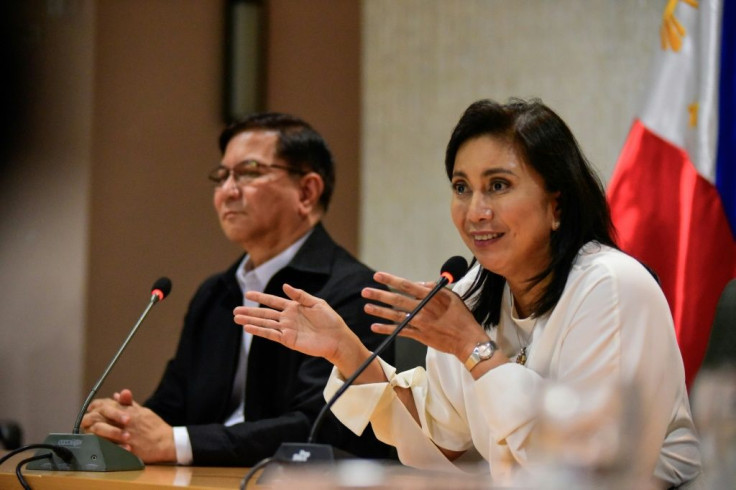Duterte Drug War Fail: 3 Years and Thousands Killed but Only 1% Crystal Meth Seized

KEY POINTS
- Philippine Vice-President Leni Robredo gives Duterte score of 1/100 in his drug war
- Says less than 1% of drugs in circulation has been seized despite thousands of deaths
- Duterte's spokesperson says Roberdo just trying to stay relevant
Philippine Vice-President Leni Robredo has given President Rodrigo Duterte a failing grade on his brutal drug war that began with his election in 2016. "If this were an exam," she said, "the government's score would be 1 out of 100.”
If the official records are accurate, then Robredo is grading on a generous curve. She stated statistics showing that only 1,000 kg of crystal methamphetamine (or shabu as it is called in the Philippines) was seized out of 156,000 kg believed to be in circulation each year in the country. That is 0.64%, less than the 1% grade she gave Duterte.
The numbers are even lower for money seized or frozen by an anti-money laundering unit. The unit froze only 1.4 billion pesos ($28 million) out of 1.3 trillion pesos ($26 billion) estimated drug money in circulation. That is just 0.107% percent. Robredo told reporters Monday she gathered the information while leading the multi-agency body tasked to oversee the President’s controversial drug war.
The VP, at a news briefing said, "It's crystal clear, that despite the thousands who were killed, and despite the huge sum and resources spent, not even 1% of the total supply of shabu and the money generated from illegal drugs were seized.”
Robredo’s comments were quickly countered by Duterte’s spokesperson Salvador Panelo who said to reporters, "It's a dud. She didn't say anything new. What was a failure was her stint (as drug czar). I think she just wants to be relevant." Panelo added he would let the government's drug enforcement agencies dispute Robredo's report.
The VP’s comments are akin to if U.S. VP Mike Pence were to openly criticize President Donald Trump over his efforts to build a wall on the Mexico border. There is, however, one huge difference. The Philippines elects the President and Vice President in separate elections, making it probable that the second in command is from an opposing political party.
Robredo’s involvement with the drug war began when Duterte dared her to prove she could wage a more effective battle against illegal drugs, the major “plank” in the platform that got Duterte elected. He installed her as co-chair of the Inter-Agency Committee on Anti-Illegal Drugs on Nov. 5 last year, but her term ended just 18 days later.
Those 18 days included consulting with drug enforcement agents from the U.S. and the United Nations, both critical of Duterte, and she named China as a major source of narcotics. This did not sit well with the President who is seeking closer ties with China and its President Xi Jinping and has expressed disdain for human rights activists and “outsiders."
Robredo’s strongest argument is her claim that Duterte’s war on drugs is not targeting the major players and suppliers but rather the drug activity in poor communities where over 6,000 petty drug users have been killed. She said, "(The drug war) failed because they focused on street-level enforcement. Even if they go on drug raids every day, if they are not constricting supply, going after big suppliers, the problem won't end.”
Duterte’s term ends in 2022 so it remains to be seen if his VP is putting herself in the limelight for a presidential campaign by her scathing assessment of the war on drugs.
© Copyright IBTimes 2024. All rights reserved.




















